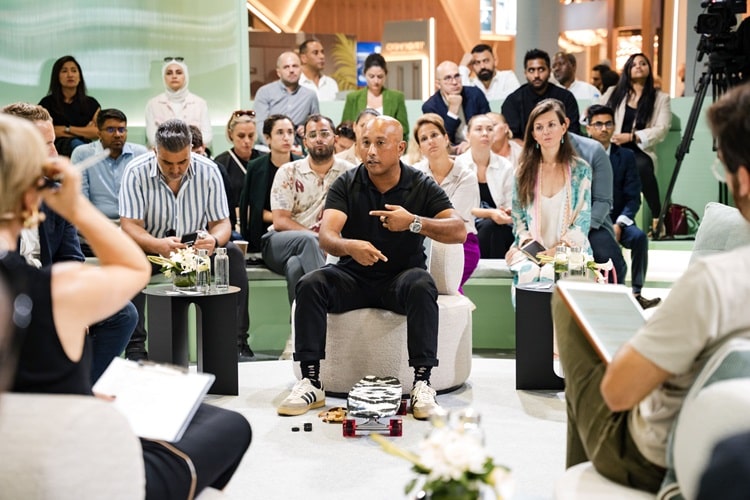HH Sheikh Ahmed bin Saeed Al Maktoum, President of Dubai Civil Aviation Authority and Chairman of Dubai Airports, officially inaugurates INDEX, Workspace, and KIDSPACE 2024
The social reinvention of unused workspaces is the next trend to look out for, say experts on opening day of Workspace Summit, which runs June 4-6 at Dubai World Trade Centre
Dubai, UAE-: This year’s INDEX, the region’s leading event for interior designers, retailers, and fit-out contractors, officially opened today at Dubai World Trade Centre (DWTC). The shows gathered thousands of industry professionals from across the globe looking to do business with international exhibitors and attend a series of high-level networking events, conferences, and live demonstrations.
Officially inaugurated by His Highness Sheikh Ahmed bin Saeed Al Maktoum, President of Dubai Civil Aviation Authority (DCAA) and Chairman of Dubai Airports, the three-day event, which is co-located alongside Workspace, The Hotel Show, Leisure Show, and KIDSPACE, is showcasing a wide range of cutting-edge products, services, and technologies tailored to meet the evolving demands of the interior design industry.
Day one of the INDEX Design Talks brought together leading figures in design, architecture, and sustainability to explore how design can play a crucial role in achieving the United Nations Sustainable Development Goals (SDGs). The opening panel, moderated by Esra Lemmens, Design Strategist at Esra Lemmens Agency, heard from Albert S Fakhoury, President of the Council for International Accreditation of Architecture & Design, Will Plowman, Partner at Foster + Partners, Carlos Mello, Creative Director with Main Guilty, Richard Wilson, Founder & Creative Director at Colab, and Ely N Skaff, Senior Design Manager with Sunset Hospitality Group.
“The future of sustainable design lies in embracing local, innovative materials,” said Wilson, while showcasing a skateboard made out of plastic bottle caps, a hotel key card made out of date seeds, and cutlery made out of palm tree oil. “While classic materials like travertine have their place, prioritizing locally sourced options like desert sand, concrete, or date seed composites reduces our environmental footprint and unlocks exciting design possibilities. Let’s shift the conversation from price point to value. Sustainable materials, when chosen wisely, become investments in lasting beauty and a healthier planet.”
Acknowledging the urgency of addressing global challenges and emphasizing the critical role of design in creating a more sustainable future, Fakhoury highlighted the importance of integrating sustainable principles into design education: “With the UAE advancing its agenda to impose a ban on single-use plastic earlier this week, this is a good reminder for all stakeholders to work together to create a more sustainable future. We can use design as a powerful tool to make a positive impact, and by working together, we can achieve the SDGs and create a sustainable world for all.”
On the opening day of this year’s Workspace Summit, a series of panel discussions delved into the industry’s current trends around integrated designs, sustainability, mental health, and the social reinvention of unused workspaces caused by companies’ adoption of a hybrid work model.
Speaking on a panel discussion around evolutionary trends in workspace design, Ben Corrigan, Founding and Managing Director at Bluehaus, cited the shift in workspace design that is more focused on people and useability rather than looks. “What’s really exciting about our industry is that there’s a real focus on people,” he said. “And it might sound quite strange to say that, but it was only 10 or so years ago that we were designing offices where it wasn’t focused on people at all, but rather on efficiency.
“Thankfully, there was a step away from that due, in part, to the COVID pandemic, which accelerated the trend towards people. It is good to see we’re designing workspaces now that, frankly, are more hospitality and F&B, as well as built in a way where people don’t have to wait up to two hours for something to be connected to a screen or go through an arduous process to book a meeting room. The integration of technology has really transformed what people expect out of a workspace, and we are clearly seeing that in the briefing process — it’s all about people.”
Iain Hird, Head of Workplace MENAT at HSBC, raised an interesting take on the social reinvention of unused workspaces and how companies can look to offer spaces to third-party entities on days where the majority of an office may be working from home. “When we look at the stats, and we see things like a drop off in office occupation on a Monday and a Friday due to hybrid work policies and look at the social value perspective regarding spare equipment, furniture, etc, we have lots of spare space at these certain times.
“As we go forward, if we get really clever, we’ve got to think about how these spaces can be leveraged by somebody else in the community. If you’ve got a 20-storey building that’s only half-full on a Friday, do we just let it sit there? Or do we have spaces that are so flexible and so dynamic that we can actually make them available to other people, and then we offer social value for empty space. We all consider that our space is our domain, and to suddenly share that space with others at different times and give it to an outside third party is really an interesting concept.”
The following panel discussion took a further look at the social aspects of a workspace, specifically around mental health and crafting supportive work environments for employees. Fatmah Alkaabi, Programs Manager at the Abu Dhabi Early Childhood Authority (ECA), believes modern workplace and culture present a unique set of challenges to employees. These are intensified for parent employees, who have to find the right balance between building a good career and being the best possible parent to their children.
“Organizations should adopt a comprehensive approach to support employees- especially parents- by going beyond traditional benefits and law-mandated leaves,” said Alkaabi. “However, policies alone are not enough; we need a deeper commitment to supporting employee well-being, a necessity for achieving these goals.”
“At the Abu Dhabi Early Childhood Authority, we believe that parenthood and work don’t need to balance each other, but can coexist, which presents a direct solution to the prevalence of ‘burnout’ culture. This belief is at the core of the Parent-friendly Label Program, which we launched to recognize private, semi-governmental, and third-sector entities that excel in creating innovative parent-supportive cultures at their workplace, which ultimately will mean better mental health for the parent employees.”
KIDSPACE, the latest addition to the event portfolio, is this week showcasing the transformation of safe and ergonomic spaces where babies and toddlers up to the age of three can live, sleep, learn, and play. The show also comprises exclusive networking events, and the KIDSPACE Talks.
Among the highlights of the event’s first day was a conference titled “Raising Confident and Well-Behaved Kids: A Parent’s Guide to Building Self-Esteem and Positive Behavior”, presented by Bahij Khouzami, an expert in Applied Behavior Analysis (ABA) specializing in Autism.
“Raising confident and well-behaved children is a primary goal for many parents, but balancing these aspects can be challenging,” said Khouzami. “Building self-esteem and fostering positive behaviour are crucial elements of a child’s development, impacting their lifelong success and happiness. Parents should have practical tools and strategies to nurture their children’s confidence and encourage positive behaviour through learning effective communication techniques, setting appropriate boundaries, and utilizing positive reinforcement to help their children thrive emotionally and socially.”
The three-day INDEX, as well as The Hotel Show, Leisure Show, KIDSPACE, and Workspace, runs from 4-6 June at Dubai World Trade Centre. To register visit: https://www.indexexhibition.com/





